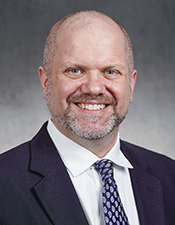Lawmakers aim to boost broadband equitability across the state
— UPDATED 12:44 p.m. March 12
Have you “cut the cord” and canceled your cable TV service to switch to streaming services to get your sports, news and entertainment on your home screens?
If you have, you are not alone and that has affected the bottom line of many cities, especially large urban cites, which have long collected franchise fees from cable companies. The idea is that cable companies should pay cities for the right-of-way needed to string their coaxial cables on city property.
That has been a successful model for four decades, said Rep. Mike Freiberg (DFL-Golden Valley), and it’s time to expand that model to internet streaming providers.
He sponsors HF4182, which would allow local governments to negotiate franchise agreements for broadband providers’ use of the public right-of-way.
“Each local government has unique needs for broadband deployment,” he said. “This bill allows local officials the option to franchise broadband and [internet service providers] in the public right-of-way.”
The House Commerce Finance and Policy Committee approved the bill Monday on a 10-6 party-line vote and sent it to the House State and Local Government Finance and Policy Committee.
Freiberg dubs the bill the “Equal Access to Broadband Act” and said that franchising is a proven way to ensure equitable and complete delivery of broadband lines, with no redlining or cherry picking, and would provide local oversight of commercial users in streets and on public assets.
Opponents of the legislation, including many chambers of commerce, say it would lead to a “Broadband Service Tax” that would be tacked on to each service delivered by a broadband provider and paid by household subscribers.
Republican objections to the bill focused on what they said were insufficient safeguards that the money generated by cities would be used as intended to benefit city residents.
Rep. Isaac Schultz (R-Elmdale Township) said the bill would set up “a revenue slush fund for local governments.”
Related Articles
Search Session Daily
Advanced Search OptionsPriority Dailies
Speaker Emerita Melissa Hortman, husband killed in attack
By HPIS Staff House Speaker Emerita Melissa Hortman (DFL-Brooklyn Park) and her husband, Mark, were fatally shot in their home early Saturday morning.
Gov. Tim Walz announced the news dur...
House Speaker Emerita Melissa Hortman (DFL-Brooklyn Park) and her husband, Mark, were fatally shot in their home early Saturday morning.
Gov. Tim Walz announced the news dur...
Lawmakers deliver budget bills to governor's desk in one-day special session
By Mike Cook About that talk of needing all 21 hours left in a legislative day to complete a special session?
House members were more than up to the challenge Monday. Beginning at 10 a.m...
About that talk of needing all 21 hours left in a legislative day to complete a special session?
House members were more than up to the challenge Monday. Beginning at 10 a.m...
